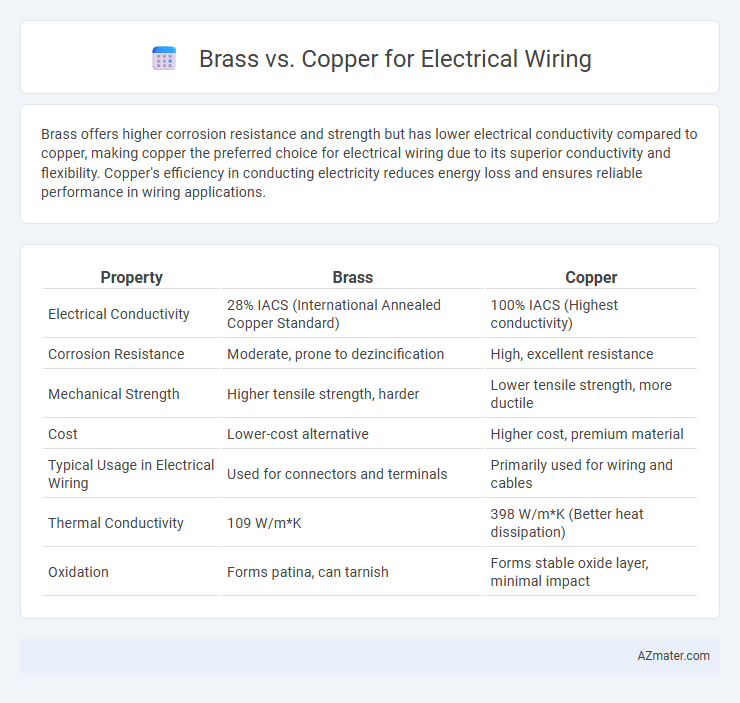Brass offers higher corrosion resistance and strength but has lower electrical conductivity compared to copper, making copper the preferred choice for electrical wiring due to its superior conductivity and flexibility. Copper's efficiency in conducting electricity reduces energy loss and ensures reliable performance in wiring applications.
Table of Comparison
| Property | Brass | Copper |
|---|---|---|
| Electrical Conductivity | 28% IACS (International Annealed Copper Standard) | 100% IACS (Highest conductivity) |
| Corrosion Resistance | Moderate, prone to dezincification | High, excellent resistance |
| Mechanical Strength | Higher tensile strength, harder | Lower tensile strength, more ductile |
| Cost | Lower-cost alternative | Higher cost, premium material |
| Typical Usage in Electrical Wiring | Used for connectors and terminals | Primarily used for wiring and cables |
| Thermal Conductivity | 109 W/m*K | 398 W/m*K (Better heat dissipation) |
| Oxidation | Forms patina, can tarnish | Forms stable oxide layer, minimal impact |
Introduction: Brass vs Copper in Electrical Wiring
Brass and copper are widely used materials in electrical wiring due to their excellent conductivity and durability. Copper offers superior electrical conductivity, making it the preferred choice for most electrical applications, while brass, an alloy of copper and zinc, provides enhanced mechanical strength and corrosion resistance. Understanding the differences in conductivity, tensile strength, and cost between brass and copper is crucial for selecting the appropriate material in electrical wiring projects.
Material Composition and Properties
Brass, an alloy primarily composed of copper and zinc, offers higher strength and corrosion resistance compared to pure copper, which consists almost entirely of copper. Copper's superior electrical conductivity, approximately 59.6 x 10^6 S/m, makes it the preferred choice for electrical wiring, while brass, with lower conductivity around 15 x 10^6 S/m, is often used in components requiring mechanical durability. The material composition difference between copper and brass directly influences their electrical performance and suitability for various wiring applications.
Electrical Conductivity Comparison
Copper exhibits superior electrical conductivity, typically around 59.6 MS/m (megasiemens per meter) at room temperature, making it the preferred choice for electrical wiring due to minimal energy loss. Brass, an alloy consisting mainly of copper and zinc, has significantly lower conductivity, approximately 15-28 MS/m, resulting in higher resistance and reduced efficiency in electrical applications. Consequently, copper's high conductivity and ductility ensure better performance and reliability in power transmission compared to brass.
Mechanical Strength and Durability
Brass offers higher mechanical strength and greater durability than copper, making it more resistant to wear, deformation, and corrosion in electrical wiring applications. Copper, while excellent for conductivity, is softer and more prone to bending and fatigue over time under mechanical stress. Thus, brass is preferred in environments where wiring is subject to physical strain or requires enhanced longevity.
Corrosion Resistance Factors
Brass exhibits superior corrosion resistance compared to copper, making it a preferred choice in environments with high moisture or chemical exposure. The alloying of zinc in brass enhances its durability against oxidation and reduces the risk of corrosion-related failures in electrical wiring. Copper, while an excellent conductor, is more prone to tarnishing and corrosion, which can compromise electrical connections over time.
Cost and Availability Analysis
Brass is generally more expensive than copper due to its alloy composition, which includes zinc along with copper, impacting raw material costs and manufacturing complexity. Copper remains widely available and is the preferred choice for electrical wiring because of its excellent electrical conductivity and ease of installation. Cost-effectiveness and high availability make copper the dominant material in residential and commercial electrical wiring applications.
Installation and Flexibility Considerations
Brass offers superior strength and corrosion resistance, making it easier to handle and install in tight spaces without risk of deformation, while copper provides exceptional electrical conductivity and is more flexible for bending during wiring runs. Copper's malleability allows for smoother bends and connections, reducing the risk of damage or breaks, whereas brass, being stiffer, requires careful manipulation to avoid stress fractures. Installation choices should weigh brass's durability against copper's flexibility, especially in applications demanding frequent adjustments or complex wiring layouts.
Safety and Fire Risk Assessment
Brass, an alloy of copper and zinc, offers greater tensile strength and durability compared to pure copper, reducing the risk of wire deformation and potential electrical faults in wiring systems. Copper exhibits superior electrical conductivity, minimizing overheating and fire hazards caused by increased resistance in electrical circuits. Fire risk assessment favors copper wiring due to its efficient heat dissipation properties and lower oxidation levels, which maintain stable electrical connections and reduce the likelihood of short circuits.
Industry Standards and Regulations
Copper is the preferred material for electrical wiring due to its superior electrical conductivity and compliance with industry standards such as the National Electrical Code (NEC) and International Electrotechnical Commission (IEC) regulations. Brass is typically used in specific components like connectors and terminals because it offers better mechanical strength and corrosion resistance but does not meet the conductivity requirements for main wiring circuits. Regulatory guidelines emphasize copper wiring for general electrical installations to ensure safety, efficiency, and code compliance in residential, commercial, and industrial applications.
Choosing the Best Material for Electrical Wiring
Copper remains the superior choice for electrical wiring due to its excellent conductivity, corrosion resistance, and flexibility, which ensures reliable long-term performance. Brass, an alloy of copper and zinc, offers increased mechanical strength but lower electrical conductivity, making it more suitable for specific applications like terminals or connectors rather than extensive wiring. Selecting copper wiring maximizes efficiency and safety in residential and commercial electrical systems.

Infographic: Brass vs Copper for Electrical Wiring
 azmater.com
azmater.com